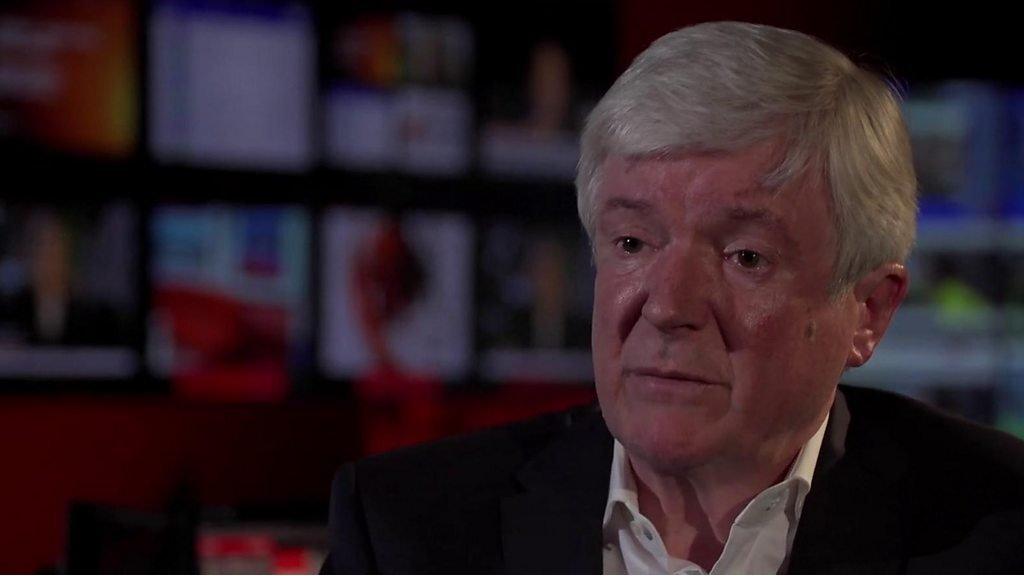Tony Hall: Departing BBC boss looks back on his time in charge
- Published
Tony Hall: 'Majority Conservative government responsible for over-75 licence fee'
Outgoing BBC boss Tony Hall says there have been "big, big changes" at the corporation since he took over in 2013.
In a wide-ranging interview with the BBC's Amol Rajan, Lord Hall said his tenure as director general began at a time the corporation was "in crisis".
He spoke about his "tense" negotiations with the government around dropping free TV licences for the over 75s.
He also addressed the recent n-word controversy, Jeremy Clarkson's departure and gender pay equality.
Lord Hall was appointed director general in 2012 following the resignation of George Entwistle, in the wake of the Lord McAlpine scandal at Newsnight.
A former director of BBC News, his return to the corporation came after a lengthy stint running the Royal Opera House.
"I found myself sitting in a room with [former BBC Trust chairman] Chris Patten, who said 'I want you to come back. And I want you to come back because, in this crisis, you're the person that needs to sort this out'," Lord Hall recalled.
At the time, serious sexual assault allegations had surfaced about the late presenter Jimmy Savile, while the BBC was also facing questions over issues such as management pay-offs.
Lord Hall will step down as director general on 31 August. His successor, Tim Davie, takes over on 1 September,
Read Lord Hall's reflections on some of the milestones of his tenure below.
Ending free TV licences for the over-75s
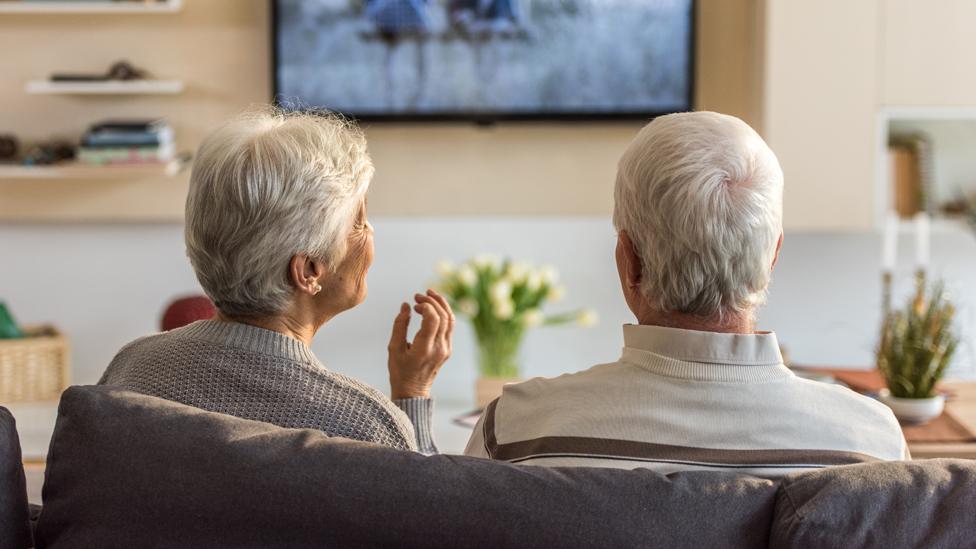
Lord Hall's time in charge may be most remembered for the deal he struck with the then-majority Conservative government in 2015 to take on the cost of free TV licences for the over-75s.
A deal he has since said the BBC cannot afford.
Lord Hall says he made clear to the committee during "tense" negotiations that this was a "nuclear" option which would bring about the "destruction" of many BBC channels, programmes and services. He told Rajan he "thought about resigning" over the issue, but decided to stay and "ameliorate" the situation.
"We've come to a solution, which is actually an absolutely fair solution, which is those who cannot afford to pay for the licence fee don't have to pay for it," Lord Hall said, noting that those on pension credit will still get it free.
"Those who can afford to pay the licence fee are paying for it."
Pressed on the criticism the BBC has received, Lord Hall replied: "But you've got to go back and say, 'who actually is responsible for this?' I didn't actively go out and say, 'give me the over-75s, we want to go and reform that'.
"This is something which the then majority conservative government put on the BBC. We ameliorated it.
"But I also want to make sure that they are getting the sort of services and the sort of programmes that will make them feel it's worthwhile," he added.
Relations with Downing Street
The prime minister is asked whether he would scrap the TV licence fee
The outgoing leader says he had not been to Downing Street to meet Prime Minister Boris Johnson and his chief advisor Dominic Cummings since their election win last year.
The PM, who has suggested the licence fee could be abolished entirely, boycotted many BBC programmes, including Radio 4's Today, during the election, leading to presenter Andrew Neil holding an interview (of sorts) with an empty chair.
Prior to that, Lord Hall said he had had an "intelligent conversation" with Cummings, who "asked very good questions about the nature of the of the BBC and the kind of journalism that he and I would believe in".
"I really do believe that there are things that the BBC can offer the UK," Lord Hall went on.
"We could be an amazing voice for the UK globally in terms of soft power."
"The BBC, as soon as you leave this country, is a major voice for the UK and I think we should build on that," he continued.
Jeremy Clarkson's departure
How Jeremy Clarkson's career on Top Gear came to an end
In 2015, Lord Hall confirmed that Jeremy Clarkson's contract would not be renewed after an "unprovoked physical attack" on a Top Gear producer.
Reflecting on his sacking, Lord Hall said there were no hard feelings from his end, but that he had been left with no option but to dismiss the presenter.
"I like Jeremy a lot," said Lord Hall. "I think he's actually a real talent, and that was a very hard decision. And he was a very special sort of person in the BBC.
"But look, you go back to your values. Jeremy did something that you just can't accept, and that's where in any of these issues your values have to come in.
Lord Hall confirmed he broke the news to Clarkson himself personally.
"We met on a number of occasions and we've met since by the way. And I'm a big fan of his and I'm sorry he left because he was a particular voice that the BBC kind of needed."
But, Lord Hall noted: "When I came back to the BBC there was rightly a lot of discussion about bullying and harrassment, and people felt strongly that some people got away with it and others didn't.
"You simply couldn't let Jeremy get away with it, because that would have said to everybody there's a culture for one set of people, and there's a culture for the rest."
More 'diversity of thought' is needed
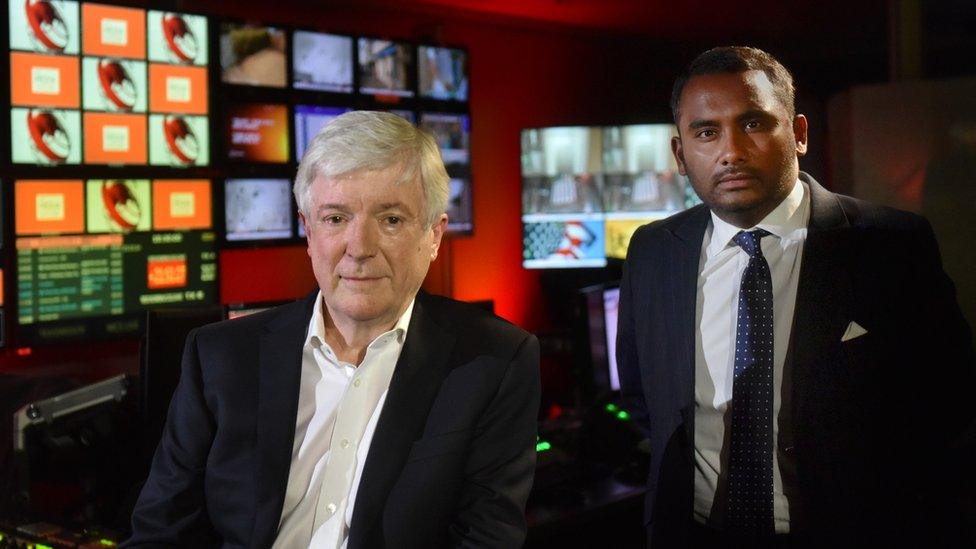
Lord Hall told Amol Rajan: "The next diversity issue for us will be achieving social diversity"
During the interview, Lord Hall also acknowledged the need for diversity of thought, in addition to racial diversity, within the BBC.
David Jordan, the BBC's director of editorial policy, recently told a House of Lords committee the corporation had issues with tracking the rise of Euroscepticism and the growth of concern about immigration in the UK.
Asked by Rajan if too many people at the BBC are "middle-class, remain-voting graduates", Lord Hall replied: "I think you have a really interesting question there, because it's something I believe in very strongly.
"The next diversity issue for us will be achieving social diversity," he said, adding that this was one reason he had increased the number of apprenticeships at the BBC.
"Diversity of thought can be one of our strengths - and what comes out of that are better programmes, and programmes that reflect the UK that we are seeking to serve."
'Big big changes' on gender pay
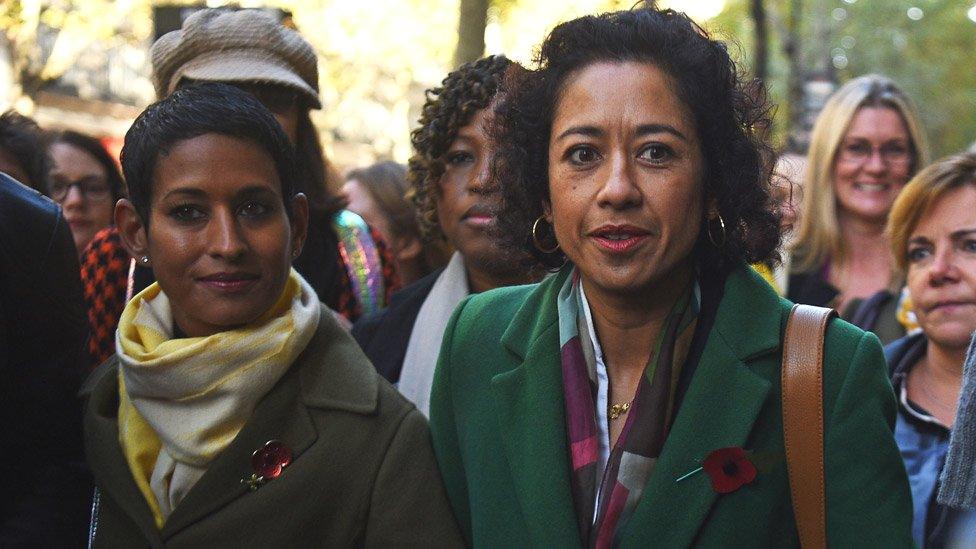
Ahmed (right) was accompanied by BBC Breakfast's Naga Munchetty on the tribunal's first day
Aside from helping to modernise the BBC - with improvements to the iPlayer, World Service and the introduction of BBC Sounds - Lord Hall says one of the first things he wanted to in the role "was to find more women presenters".
While he was at the helm, several female presenters - including Carrie Gracie and Samira Ahmed - successfully took the BBC to court for not being paid as well as their male counterparts.
Lord Hall said he was happy to report that things were changing rapidly in that regard.
"The biggest change, which shows you the journey we've been on, is that if you go back to 2016/2017 - 75% of presenters earning more than £150,000 were men, and 25% were women," he noted.
"The figures we'll be announcing when the annual report and accounts come out [this year] is we're down to 55% men, 45% women. And we will get to 50/50 in this year - I shan't be around to say that but I know we'll get to it this year."
Lord Hall added that four of the top 10 highest earners at the BBC were women last year, which will be shown in the corporation's next annual report, due out in the coming weeks.
"Now, I defy any organisation to make that amount of change that rapidly, I think that is big, big change. And that's come because we really wanted to make a difference. And, by the way, we've got around 20% from BAME [black, Asian, minority ethnic] backgrounds as well."
The recent N-word controversy
DJ Sideman: "On this occasion I just don't think that I can look the other way"
More than 18,000 complaints were received by the BBC after a recent news item about a racially motivated attack, in which the white reporter used the n-word.
The BBC initially doubled down on its decision to use it, but Lord Hall later apologised, promising that the editorial guidelines would be changed.
"I felt strongly that this was a difficult story," said Lord Hall. "Remember, this is a story about abuse of somebody - a racially motivated hit-and-run. But I felt using the n-word at that time of day in that report was was a mistake.
"These are difficult decisions and in the end, occasionally I have intervened as director general when I felt it was right to say, 'No, this is what I believe'."
He acknowledged that "people were furious" and stressed how important it was for the BBC to "own up to our mistakes".
But the offensive word itself, he confirmed, has not been totally banned.
"No, it's not. In fact, on the Friday before I apologised it was used in a programme about [British soul group] The Real Thing, and that was appropriate. I went through all the guidelines and it was appropriately done.
"It's where? When? How often? And so on. We need to think very, very hard about it, and that's what we're doing."

'The toughest job of any DG'
Analysis by Amol Rajan, media editor
Tony Hall's tenure can be split into three broad chapters: sorting crises caused by scandals over Jimmy Savile, Lord McAlpine and pay-offs; negotiating a new Charter; and readying the BBC for a much more digital world.
He was successful on the first. On the second, the revelation that he considered resigning over the BBC being told to take on a welfare payment for the over-75s shows just how much his deal with a Conservative majority government shaped his reign. The same will be true of his successor.
More recently, he has made big structural changes: the sign-in requirement on the iPlayer, programmes staying up for 12-months; launching BBC Sounds; and the merger of Studios and Worldwide.
All these have shown positive early signs. Yet the BBC still finds itself trying to work out its place in a global media landscape of constant upheaval. And, like many national institutions, its attempt to navigate a country infinitely more diverse and digital than when Tony Hall joined the BBC can itself cause divisions.
For all that, he has been an effective DG, who probably had the toughest job of any DG.

The Media Show is broadcast at 16:30 BST every Wednesday on BBC Radio 4, and is available on the BBC Sounds app.
- Published25 August 2020
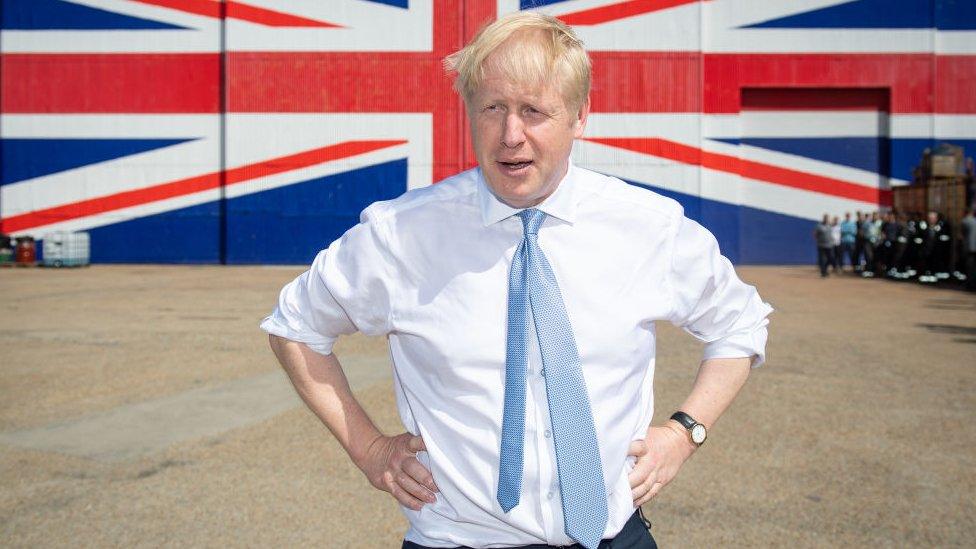
- Published25 August 2020
